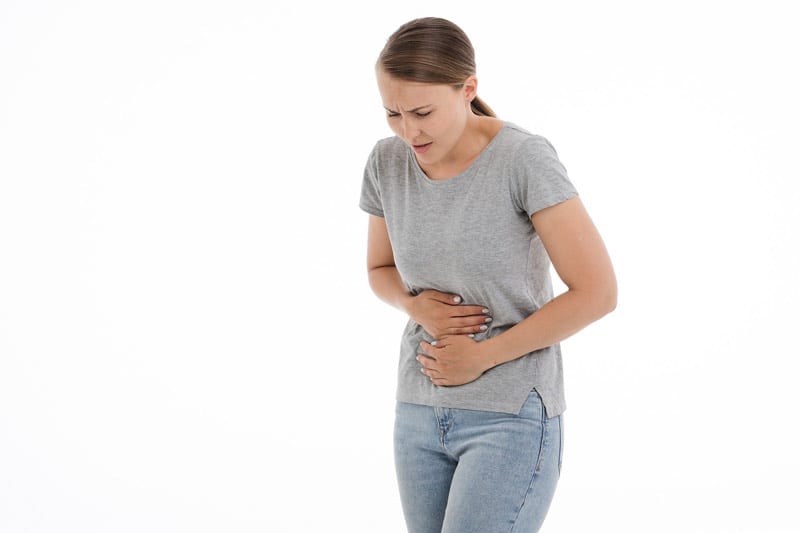Our intestines play an important role. They not only digest food but also extract nutrients from it. Bowels are a protective barrier between internal organs and the outside world but they have one weak spot. The intestinal mucosa consists of a thin layer of epithelial cells that are interconnected by special proteins.
These proteins don’t let toxins, undigested food particles, viruses, and other foreign bodies that enter the intestines with food get into the bloodstream. If a person has a strong immune system, bowels will protect the body from danger.
But intestinal epithelium is very sensitive and if it’s damaged, microscopic holes appear on it. This allows dangerous substances and viruses to enter the bloodstream and then into organs and tissues.
What’s the link between intestines and depression?
The link between depression and a damaged intestinal epithelium is inflammation. It’s caused by intestinal bacteria that enter the bloodstream through microscopic holes on the epithelium and release toxins called endotoxins. This disorder is called leaky gut syndrome.
These toxins trigger inflammatory proteins called cytokines. Cytokines change the production and transmission of neurotransmitters responsible for your mood. And this leads to negative emotions and fatigue.
There is a lot of evidence that cytokines and endotoxin lipopolysaccharide can lead to clinical depression. According to researchers, 47% of people with this disorder have an increased level of inflammation in the body. This is a common condition since improper nutrition can easily trigger inflammatory processes.
Common causes of inflammation and depression
Medicines
Non-steroidal anti-inflammatory drugs often cause intestinal permeability which then leads to a leaky gut. These drugs include aspirin, ibuprofen, and diclofenac. According to studies, approximately two-thirds of people who use these medicines suffer from intestinal permeability.
Stress and anxiety
Stress and anxiety lead to a leaky gut syndrome which in turn exacerbates these two conditions. In addition, constant stress contributes to free radical formation. This also affects intestinal permeability.
Dysbiosis
Dysbiosis is an imbalance of microbial balance inside the gut. Symptoms of dysbiosis include bloating, gas, abdominal cramps, and other gastrointestinal disorders, as well as confusion and depression. If you notice these symptoms, consult a gastroenterologist in order to prevent a leaky gut.
Improper nutrition
Products that trigger intestinal permeability include alcohol, sugar, simple carbohydrates, and refined vegetable oils. They have a lot of omega-6 unsaturated fatty acids that contribute to the development of inflammatory processes.
Smoking
Smoking harms not only your bowels but also your overall health since it causes active free radical formation.
Allergens
Certain foods that cause allergy or intolerance also lead to intestinal permeability and thus can easily cause leaky gut syndrome.
How to treat it?
Take Probiotics
Probiotics fight harmful bacteria and restore the intestinal microflora. They also strengthen the bonds between intestinal epithelial cells and secrete anti-inflammatory substances.
Moreover, they have a positive effect on the psyche. According to one study, symptoms of psychological stress, including depression and anxiety in patients were significantly reduced after 30 days of taking probiotics.
Give up sugar and refined carbohydrates
White bread, white rice, pasta, potatoes, chips, sweets in the intestines are broken down into glucose which enters the bloodstream, raising the level of insulin. Insulin is a hormone that provokes inflammation.
Restrict refined oils
Vegetable oils with omega-6 unsaturated acids are used in almost all fast foods and snack foods. Therefore, it’s better to cook your own meals using olive oil, coconut oil, or butter since they don’t provoke free radical formation.
Eat more vegetables
Try to eat vegetables and leafy greens every day. They contain many antioxidants that fight free radicals. In addition, they are a good source of probiotics.
Include fermented foods in your diet
Yogurt, kefir, sauerkraut, and pickled vegetables increase the content of lactic acid bacteria. They also improve the intestinal microflora.
Eat fatty fish
Salmon, trout, mackerel, herring, anchovy, and sardines are rich in anti-inflammatory omega-3 fatty acids. They are essential for brain function and are associated with mood and cognitive functions. Patients with depression have been found to have lower levels of these acids.
Check medicines you take
If you are taking non-steroidal anti-inflammatory drugs, talk with your doctor about other treatment options in order to prevent bowel problems.
Avoid Allergens
If you know that some foods cause allergic reactions in you, avoid them. In the case when you don’t know which foods cause your allergy, try to exclude foods with gluten. It is contained in wheat, barley, and rye.
Don’t snack between meals
Long breaks, like short-term fasting, reduce inflammation but It’s not necessary to starve. You can simply stop snacking and eat only when you are hungry.
About the Author: I am Amelia Grant, journalist, and blogger. I think that information is a great force that is able to change people’s lives for the better. That is why I feel a strong intention to share useful and important things about health self-care, wellness and other advice that may be helpful for people. Regular communication with different doctors, including gastroenterologists from Manhattan Gastroenterology, helps me provide people with the latest medical news and essential information. Being an enthusiast of a healthy lifestyle that keeps improving my life, I wish the same for everyone.
Image by Анастасия Гепп from Pixabay
The opinions and views expressed in this guest blog do not necessarily reflect those of www.rtor.org or its sponsor, Laurel House, Inc. The author and www.rtor.org have no affiliations with any products or services mentioned in this article or linked to herein.
Recommended for You
- How a Health Cleanse Can Reset Your Body and Mind - April 16, 2025
- The Truth about Relapse in Addiction Recovery - April 14, 2025
- The Power of Peer Support in Mental Health Recovery - April 10, 2025





